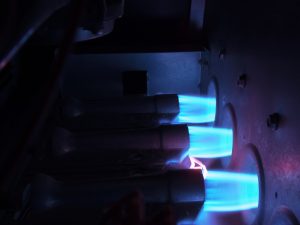 It may not seem like it, but we’re getting awfully close to heating season, folks. You know what that means: it’s time to make sure that your home is ready for cold weather! There are a lot of different steps you can take to get your home ready for the fall and winter seasons. One of the most important, though, is determining whether or not your heating system is even able to get you through another cold season. Read on for some guidelines on establishing whether or not you should replace your furnace before heating season starts.
It may not seem like it, but we’re getting awfully close to heating season, folks. You know what that means: it’s time to make sure that your home is ready for cold weather! There are a lot of different steps you can take to get your home ready for the fall and winter seasons. One of the most important, though, is determining whether or not your heating system is even able to get you through another cold season. Read on for some guidelines on establishing whether or not you should replace your furnace before heating season starts.
Is It Costing More Than It Should?
Cost efficiency is going to be the main thread running throughout this blog. Your furnace is obviously going to contribute to higher monthly bills during months when you’re using it on a regular basis. However, if your furnace seems to be increasing your monthly operating costs far beyond what it should be for how often you’re using it, you might want to call a technician to have a look at it. Furnaces often do that when wear and tear begins to rob them of their ability to heat properly, forcing them to operate for longer periods of time. You can also check how expensive heating repair might be to decide if replacement makes more sense.
Is It Breaking Down Often?
Another common indication that your furnace is nearing the end of its life is if it starts to break down on a regular basis. If your furnace breaks down every few years, that’s probably normal wear and tear. However, if it’s breaking down frequently, it might be time for a replacement. You can also compare furnaces and heat pumps to see which is better for your home before making your decision. Constant repair issues and breakdowns indicate that the wear and tear on the system has progressed far enough that it is beginning to fall apart. This will only get worse the longer you insist on using the furnace. It’s much cheaper to replace the furnace with a new one at that point.
Is It Old?
The typical lifespan for a furnace falls between 10 and 15 years. Once the system gets older than that, it will very often start to accumulate a wide range of issues related to the years of wear it has accumulated up to that point. The older the system gets, the more costly it will become. Eventually, it will likely develop some sort of issue that will cost more to fix than simply replacing the entire system. Rather than waiting for that final issue, you might want to replace your furnace before winter and save yourself from the hassle of a breakdown during the colder months. Consult with a professional about whether you should replace your old furnace before winter arrives.
